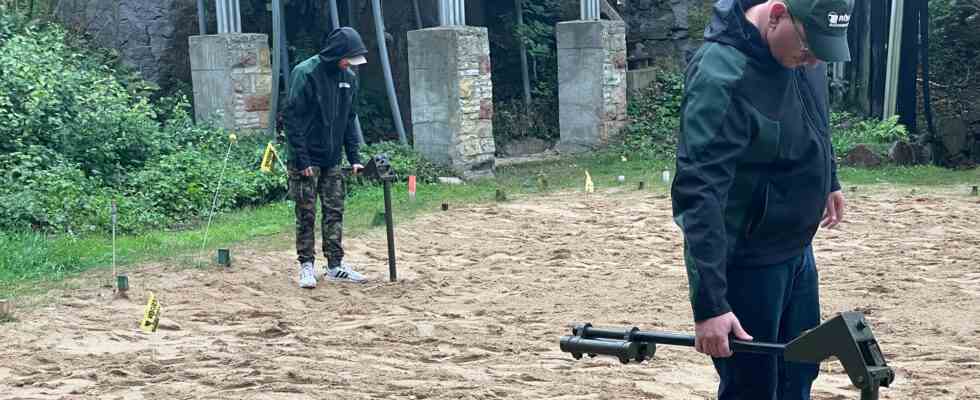in the middle
Status: 10/20/2022 2:00 p.m
Duds from the world wars are still lying in the ground. If they come to light – for example during construction work – the explosive ordnance clearance service has to step in. How do you become a demolition expert? Visiting a Dresden blasting school.
It’s just after 8 a.m. Final preparations are underway on a property on the outskirts of Dresden. The site is fenced, surrounded on one side by high rock faces. At the gate, the sign “Caution! Blasting work” reveals what this is all about. The property belongs to the Dresden blasting school.
Today, a course on explosive ordnance disposal is on the agenda. 27 men and one woman stand in a semicircle around their instructor. Markus Fricke is part of the school’s management team and sets the task for the day: “Detonators in combination with explosives.” There will be a demonstration for the participants. You should see what effect a detonator can have alone or together with a few grams of explosives. To make them aware again of what they are dealing with in their everyday work.
Old explosive devices lie on a shelf at the explosives school.
Image: Sven Knobloch
Ammunition in forest fire areas
Dustin Schmidt works for a private explosive ordnance clearance company on a military training area in Brandenburg – in the very region where there were devastating forest fires on areas contaminated with munitions in the summer. “We’ve found everything there, from small cartridges to large bombs,” he says.
So far he has only worked there as a simple laborer. With further training at the Dresden blasting school, he wants to be able to take on more responsibility in the future and lead a clearing team. He follows the demonstration together with his colleague Eric Peltzer. “You shouldn’t be afraid at work, but you shouldn’t lose respect,” says Peltzer.
#in the middle of a blasting school in Dresden
Sven Knobloch, MDR, daily topics, October 20th, 2022
Pig paw is designed to simulate hand
After a few minutes, Markus Fricke and his colleagues attached explosive charges to various objects: a few cans, a steel plate and a pig’s paw. The paw is intended to simulate the explosive effect on a human hand.
Course director Fricke blows a horn. It’s the sign to take cover. The participants go into a bunker. Many pull out their cell phones and make videos. Markus Fricke turns the crank on the blasting machine. “I detonate in 3,2,1…” The earth trembles a little with the explosions. They are loud and echo off the cliff walls. smoke rises. “It has quite a bit of energy, even with so little explosive,” says Eric Peltzer.
The group looks at the result. The pig’s paw is completely torn open. “Rather bad with the chance of recovery,” says course leader Fricke. Now the group should learn how to use explosives and detonators themselves. In their everyday work, bombs or grenades found in this way could be destroyed if they can no longer be defuse or transported.
Dangerous job, urgent warning: The explosives school in Dresden has a good reputation.
Image: Sven Knobloch
Participants learn how to use metal probes
Under supervision, Dustin Schmidt and Eric Peltzer insert a detonator into a small packet of explosives and place it in a hollow. Again it goes into the bunker. This time, course participant Dustin Schmidt turns the crank on the blasting machine. Red light is on. “3,2,1, ignition!” It works, the explosive charge goes off.
This day is only a small part of the three-week training. There are theoretical and practical units. The participants learn how to use metal probes, how to recognize duds and how to dig them up correctly. At the end there is a final exam.
Tens of thousands of duds still in the ground
The attention that the forest fires brought to the topic is often short-lived. State funds are limited and it is difficult to find personnel for explosive ordnance disposal. Because the work is physically demanding and the workers are often away from home for weeks.
Dustin Schmidt and Eric Peltzer end up passing their course. They are aware that it is not foreseeable when their task will be completed: clearing Germany of old ordnance.

